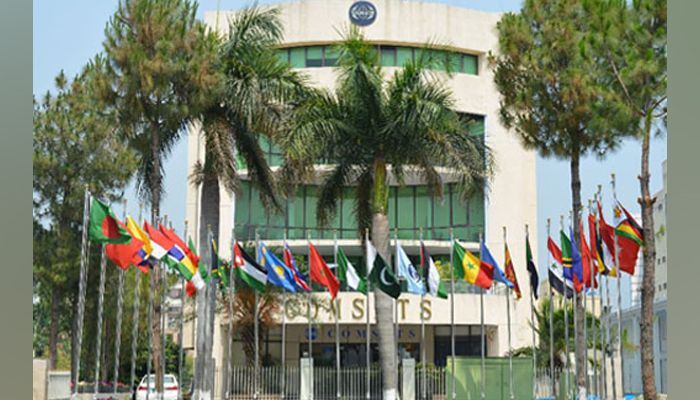Speakers emphasise active role of women in science to foster economic prosperity
ED Comsats delivered opening remarks, stressed importance of equal participation of women in addressing global challenges
Islamabad: Speaker at a webinar titled ‘Women in Science: Shaping Tomorrow’s Innovations’ held here Monday emphasised the active role of women in science, technology, and innovation to foster economic prosperity and sustainable development.
The webinar was arranged by the Commission on Science and Technology for Sustainable Development in the South (Comsats) to commemorate the International Day of Women and Girls in Science. The event, held in a hybrid format at the Comsats Secretariat in Islamabad, brought together a diverse panel of speakers to explore the pivotal role of women in Science, Technology, Innovation, and Engineering. Participants from around the globe joined the webinar.
Executive Director of Comsats, Ambassador Dr. Mohammad Nafees Zakaria delivered the opening remarks and stressed the importance of equal participation of women alongside men in addressing global challenges. Dr. Zakaria reiterated Comsats’ commitment to advocating for and promoting gender equality in the realm of science, technology, and innovation worldwide.
He highlighted the significance of this day as a call to action, acknowledging women’s invaluable contributions to science and the ongoing journey towards gender equality in the field. Dr. Zakaria emphasised that women bring a unique perspective to scientific endeavours, enhancing them with diversity in thought and experience, thereby contributing to a more comprehensive understanding of complex issues.
A distinguished member of the Senate of Pakistan and recently appointed CEO of Gavi, the Vaccine Alliance Senator Dr. Sania Nishtar expressed appreciation to Comsats for organizing this significant event. In her video message, Dr. Sania underscored that achieving gender equality in science, technology, and innovation is not only a matter of social justice but also essential for fostering economic prosperity and sustainable development.
She highlighted the evolving nature of innovation, which now encompasses a broader range of influences beyond traditional science and technology advancements, particularly environmental and societal challenges. In this new paradigm, the socio-economic empowerment of women emerges as a crucial catalyst for driving innovation forward.
President of The World Academy of Sciences (TWAS), Prof. Dr. Quarraisha Abdool Karim shared valuable insights into her three decades of research contributions that have significantly influenced the global HIV prevention efforts. She highlighted that developing countries must maximize the potential of their Research and Innovation systems while promoting gender equality in scientific fields.
He said that integrating gender considerations into the Science, Technology, and Innovation landscape can provide developing countries with a significant competitive edge. Professor Dr. Rana Dajani from Hashemite University in Jordan emphasized the importance of nurturing an inclusive environment in academia and research.
She shared her experience of introducing a simple yet impactful model and activity ‘We Love Reading’ an inter-generational initiative, promoting healing, connection, and positive self-development through the joy of reading. Further, Dr. Dajani highlighted that a significant imbalance in women’s representation persists across various levels of the professional hierarchy, particularly in leadership roles.
-
 ‘Stingy’ Harry, Meghan Markle Crack Open A Chasm Despite Donation: ‘Do So At Your Own Peril’
‘Stingy’ Harry, Meghan Markle Crack Open A Chasm Despite Donation: ‘Do So At Your Own Peril’ -
 Research Explores How TikTok’s Recommendation System May Influence Teen Beliefs
Research Explores How TikTok’s Recommendation System May Influence Teen Beliefs -
 Google Wins Approval To Export South Korea’s High-precision Maps After 20 Years—With Strict Conditions
Google Wins Approval To Export South Korea’s High-precision Maps After 20 Years—With Strict Conditions -
 King Charles’ Health Battle: What Has Been Revealed About His Cancer So Far
King Charles’ Health Battle: What Has Been Revealed About His Cancer So Far -
 Bad Bunny Tugs At People’s Heartstrings With A Generous Act Of Love: ‘Our Staff Didn't Even Realize’
Bad Bunny Tugs At People’s Heartstrings With A Generous Act Of Love: ‘Our Staff Didn't Even Realize’ -
 Paramount Wins Warner Bros. Bidding War As Netflix Abandons Deal: Here’s Why
Paramount Wins Warner Bros. Bidding War As Netflix Abandons Deal: Here’s Why -
 Cardi B Finally Responds To Accusations About Destroying 'SNL' Set After Nicki Minaj Joke
Cardi B Finally Responds To Accusations About Destroying 'SNL' Set After Nicki Minaj Joke -
 Gorton And Denton By-election Result: Green Party Defeats Labour In Blow To Keir Starmer
Gorton And Denton By-election Result: Green Party Defeats Labour In Blow To Keir Starmer -
 Jack Dorsey Cuts 4,000 Roles, Says AI Requires Smaller Teams
Jack Dorsey Cuts 4,000 Roles, Says AI Requires Smaller Teams -
 Reggie Bannister Health Takes ‘difficult Turn’ Amid Dementia, Parkinson’s Battle
Reggie Bannister Health Takes ‘difficult Turn’ Amid Dementia, Parkinson’s Battle -
 'Humble Traitor' Rob Rausch Makes Unexpected Move After Betraying Maura Higgins In Season 4
'Humble Traitor' Rob Rausch Makes Unexpected Move After Betraying Maura Higgins In Season 4 -
 Sarah Ferguson Drops An Accusation Against Andrew? ‘He Just Wants Leverage’
Sarah Ferguson Drops An Accusation Against Andrew? ‘He Just Wants Leverage’ -
 Anthropic Rejects Pentagon Military AI Proposal, Holds Firm On Safety Guardrails —What’s Next?
Anthropic Rejects Pentagon Military AI Proposal, Holds Firm On Safety Guardrails —What’s Next? -
 'Traitors' Reunion Drama: Rob Rausch Defends Strategy, Makes Shocking Revelation After Victory
'Traitors' Reunion Drama: Rob Rausch Defends Strategy, Makes Shocking Revelation After Victory -
 Inside Hillary Clinton’s Epstein Testimony: Key Takeaways And Highlights Explained
Inside Hillary Clinton’s Epstein Testimony: Key Takeaways And Highlights Explained -
 'Too Hard To Be Without’: Woman Testifies Against Instagram And YouTube
'Too Hard To Be Without’: Woman Testifies Against Instagram And YouTube




